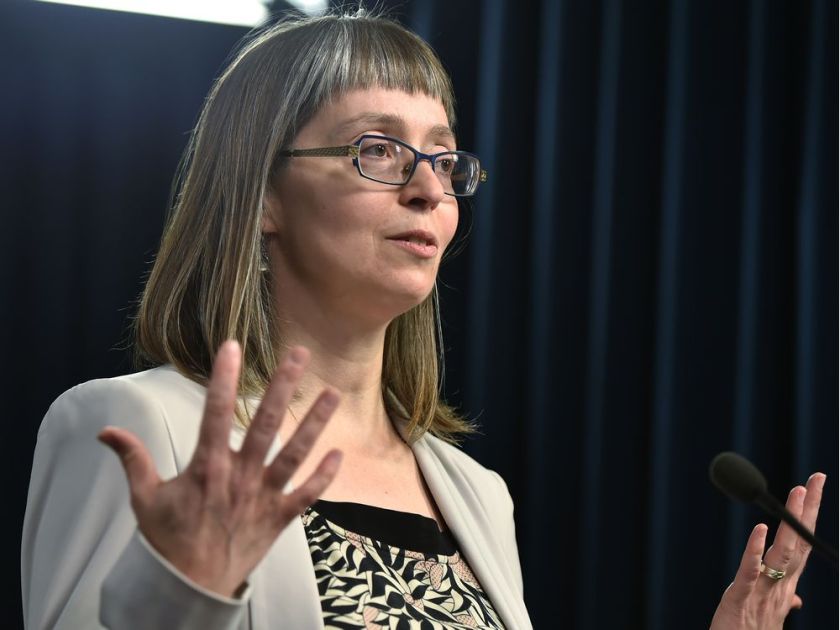Alberta’s chief medical officer of health, Dr. Deena Hinshaw gives an update on the novel coronavirus during a news conference at the Alberta legislature on Monday, March 2, 2020.
As the number of confirmed COVID-19 cases in Alberta doubled to 14 Tuesday, the province’s top health official said the decision about whether to cancel mass gatherings is something organizers should assess on a case-by-case basis.
But health officials are working with politicians to set policy on when government would start requiring mandatory bans on large public events, in case those measures become necessary.
“We need to make sure that we’re aggressive and we’re ahead of where we need to go,” Alberta chief medical health officer Dr. Deena Hinshaw told media in Edmonton on Tuesday.
Alberta Health declined to comment on when they expect to unveil policy but said it will focus on risk level, not a specific number of cases.
All confirmed cases in Alberta are related to out-of-country travel and all infected Albertans are in isolation, Hinshaw said, two factors that minimize the risk of public gatherings.
“That means that these are not cases that are spreading within the province, so we’re not seeing that transmission happening at this time,” she said.
A risk assessment tool is available on the Government of Canada website to help guide decisions on postponing or cancelling events, Hinshaw noted. The tool asks event organizers to consider factors including whether attendees are coming from parts of the world affected by the new coronavirus, whether attendees are vulnerable populations such as seniors and whether the event includes activities that could lead to transmission.
The federal guidelines also offer ways to reduce the risk without cancelling the event, such as by limiting the number of people who attend, staggering arrivals and departures, making more handwashing stations available or even livestreaming activities online.
Some Calgary event organizers aren’t waiting for an official decree to cancel their gatherings.
On Tuesday, organizers for the World’s Longest Hockey Game fundraiser event, set to take place in Calgary in July 2020, announced they were postponing the event until 2021 due to the COVID-19 outbreak, as well as economic turmoil in Alberta. The event would have raised money for local charities over a marathon 12 days.
“With players sleeping in such tight quarters and international dignitaries coming we felt this would be the safest way to ensure the health of our players, staff and spectators,” Ray Francis, the event’s chair, said in a statement.
Calgary Flames say they’re monitoring the COVID-19 situation, but not yet making any decisions on limiting fan attendance at games.
Gavin Young /
Postmedia
Earlier in the week, the City of Calgary announced the cancellation of its Safety Expo, an annual educational event at city hall for students in Grades 5 and 6, which would have taken place Wednesday and Thursday. Officials said the decision was made “out of an abundance of caution,” in part due to the amount of youth and first responders who would have been in attendance.
A number of high-profile North American events have either been postponed or will go on with restricted public access.
Grunge band Pearl Jam announced Tuesday it would postpone the initial leg of its tour, including some Canadian dates, over concerns about COVID-19. It’s the first major act to cancel a live performance in Canada because of the virus, according to the Canadian Live Music Association.
The National Hockey League is also monitoring the spread of the virus in Canada and the United States and putting contingency plans together in case large gatherings become unsafe. In the California county home to the San Jose Sharks, where public health officials have banned gatherings of more than 1,000 people, the team may play home games in an empty building or at another site.
The Calgary Flames say they’re monitoring the situation and taking precautionary measures.
Meanwhile, local arts organizations such as the Calgary Philharmonic Orchestra and Theatre Calgary say they will move forward with business as usual until Alberta Health Services or a level of government tells them otherwise, adding that they’re introducing measures to reduce risk at their events.
— With files from Sammy Hudes and The Canadian Press
Twitter: @jasonfherring
